Dear Zazie, Here is today’s Lovers’ Chronicle from Mac Tag dedicated to his muse. Rhett
The Lovers’ Chronicle
Dear Muse,
© copyright 2020 mac tag/cowboy coleridge all rights reserved
put on the candlelight
what voice this,
that most persuades
once more be thus,
that will be the last
you come more near than most
and that is what must be sought
there is no holdin’ back,
the verse, the words
hear them
they are for you
and imagine,
the days of us
© copyright 2018 mac tag/cowboy coleridge all rights reserved
thanks Karen…
“Every day
is Día de Muertos
if it’s spent without the one
who makes you feel alive.”
remember when you wrote, imagine…
i believe i wrote back,
that would be a dream come true
so far, it has been a dream
and a pleasure
and i thank you
snow yesterday
but the sun came out
and melted it all away
still chilly though,
so there is a fire
in the wood stove
now imagine a man
pourin’ dark red wine
listenin’ to Lou Reed
and writin’ verse
in solitude
a man with so much
and yet without
a man with feelin’s
as cold as the snow
waitin’ for a thaw
a man imaginin’
a day
with the one
© copyright 2017 mac tag/cowboy Coleridge all rights reserved
On this day in 1604 – William Shakespeare’s tragedy Othello is performed for the first time, at Whitehall Palace in London.

Othello (The Tragedy of Othello, the Moor of Venice) is a tragedy by William Shakespeare, believed to have been written in 1603. It is based on the story Un Capitano Moro (“A Moorish Captain”) by Cinthio, a disciple of Boccaccio, first published in 1604. The story revolves around four central characters: Othello, a Moorish general in the Venetian army; his beloved wife, Desdemona; his loyal lieutenant, Cassio; and his trusted but ultimately unfaithful ensign, Iago. Given its varied and enduring themes of racism, love, jealousy, betrayal, revenge and repentance, Othello is still often performed in professional and community theatre alike, and has been the source for numerous operatic, film, and literary adaptations.

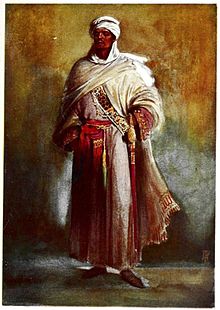



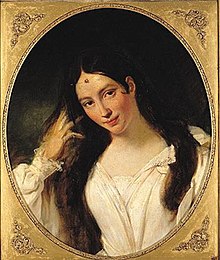
-

Othello with Desdemona in bed asleep by Christian Köhler (1859)
-

Othello and Desdemona byAlexandre-Marie Colin, 1829
-
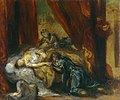
The Death of Desdemona byEugène Delacroix
-

Italian actor Tommaso Salvini as Othello, 1875
-

American actor John McCullough as Othello, 1878
-

Othello relating his adventures to Desdemona and Brabantio from a steel engraving of a painting by Charles West Cope, 1873
-
Desdemona’s Death Song by Dante Gabriel Rossetti, ca. 1878–1881
-

Desdemona byFrederic Leighton, ca. 1888
-
Petre Otskheli design for Othello, staged byKote Marjanishvili, 1933
Act I
- In following him, I follow but myself.
- Iago, scene I
- Heaven is my judge, not I for love and duty,
But seeming so, for my peculiar end:
For when my outward action doth demonstrate
The native act and figure of my heart
In compliment extern, ’tis not long after
But I will wear my heart upon my sleeve
For daws to peck at: I am not what I am.- Iago, scene I
- Even now, now, very now, an old black ram
Is tupping your white ewe.- Iago, scene I
- Your daughter and the Moor are now making the beast with two backs.
- Iago, scene I
- Keep up your bright swords, for the dew will rust them.
- Othello, scene II
- Most potent, grave, and reverend signiors,
My very noble and approved good masters,
That I have ta’en away this old man’s daughter,
It is most true; true, I have married her:
The very head and front of my offending
Hath this extent, no more. Rude am I in my speech,
And little bless’d with the soft phrase of peace:
For since these arms of mine had seven years’ pith,
Till now some nine moons wasted, they have used
Their dearest action in the tented field,
And little of this great world can I speak,
More than pertains to feats of broil and battle,
And therefore little shall I grace my cause
In speaking for myself. Yet, by your gracious patience,
I will a round unvarnish’d tale deliver
Of my whole course of love; what drugs, what charms,
What conjuration and what mighty magic,
For such proceeding I am charged withal,
I won his daughter.- Othello, scene III
- Her father loved me; oft invited me;
Still question’d me the story of my life,
From year to year, the battles, sieges, fortunes,
That I have passed.
I ran it through, even from my boyish days,
To the very moment that he bade me tell it;
Wherein I spake of most disastrous chances,
Of moving accidents by flood and field
Of hair-breadth scapes i’ the imminent deadly breach,
Of being taken by the insolent foe
And sold to slavery, of my redemption thence
And portance in my travels’ history:
Wherein of antres vast and deserts idle,
Rough quarries, rocks and hills whose heads touch heaven
It was my hint to speak,–such was the process;
And of the Cannibals that each other eat,
The Anthropophagi and men whose heads
Do grow beneath their shoulders. This to hear
Would Desdemona seriously incline:
But still the house-affairs would draw her thence:
Which ever as she could with haste dispatch,
She’ld come again, and with a greedy ear
Devour up my discourse: which I observing,
Took once a pliant hour, and found good means
To draw from her a prayer of earnest heart
That I would all my pilgrimage dilate,
Whereof by parcels she had something heard,
But not intentively: I did consent,
And often did beguile her of her tears,
When I did speak of some distressful stroke
That my youth suffer’d. My story being done,
She gave me for my pains a world of sighs:
She swore, in faith, twas strange, ’twas passing strange,
‘Twas pitiful, ’twas wondrous pitiful:
She wish’d she had not heard it, yet she wish’d
That heaven had made her such a man: she thank’d me,
And bade me, if I had a friend that loved her,
I should but teach him how to tell my story.
And that would woo her. Upon this hint I spake:
She loved me for the dangers I had pass’d,
And I loved her that she did pity them.
This only is the witchcraft I have used:
Here comes the lady; let her witness it.- Othello, scene III
- That I did love the Moor to live with him,
My downright violence and storm of fortunes
May trumpet to the world: my heart’s subdued
Even to the very quality of my lord:- Desdemona, scene III
- But he bears both the sentence and the sorrow
That, to pay grief, must of poor patience borrow.- Duke, scene III
- The robb’d that smiles, steals something from the thief;
He robs himself that spends a bootless grief.- Duke of Venice, scene III
- Look to her, Moor, if thou hast eyes to see:
She has deceived her father, and may thee.- Brabantio, scene III
- Thus do I ever make my fool my purse.
- Iago, scene III
- I hate the Moor;
And it is thought abroad, that ‘twixt my sheets
He has done my office: I know not if ‘t be true;
But I, for mere suspicion in that kind, will do as if for surety.- Iago, scene III
- The Moor is of a free and open nature,
That thinks men honest that but seem to be so,
And will as tenderly be led by the nose
As asses are.- Iago, scene III
Act II
- If after every tempest come such calms,
May the winds blow till they have waken’d death!- Othello, scene i
- She never yet was foolish that was fair; For even her folly help’d her to an heir.
- Iago, scene I
- Knavery’s plain face is never seen till us’d.
- Iago, scene i
- Reputation is an idle and most false imposition; oft got without merit and lost without deserving.
- Iago, scene iii
- Now, by heaven,
My blood begins my safer guides to rule;
And passion, having my best judgment collied,
Assays to lead the way. ‘Zounds, if I stir,
Or do but lift this arm, the best of you
Shall sink in my rebuke. Give me to know
How this foul rout began, who set it on;
And he that is approv’d in this offence,
Though he had twinn’d with me, both at a birth,
Shall lose me. What! in a town of war,
Yet wild, the people’s hearts brimful of fear,
To manage private and domestic quarrel?
In night, and on the court and guard of safety?
‘Tis monstrous. Iago, who began’t?- Othello, scene iii
- And what’s he then that says I play the villain?
When this advice is free I give and honest,
Probal to thinking and indeed the course
To win the Moor again? For ’tis most easy
The inclining Desdemona to subdue
In any honest suit: she’s framed as fruitful
As the free elements. And then for her
To win the Moor — were’t to renounce his baptism,
All seals and symbols of redeemed sin,
His soul is so enfetter’d to her love,
That she may make, unmake, do what she list,
Even as her appetite shall play the god
With his weak function. How am I then a villain
To counsel Cassio to this parallel course,
Directly to his good? Divinity of hell!
When devils will the blackest sins put on,
They do suggest at first with heavenly shows,
As I do now: for whiles this honest fool
Plies Desdemona to repair his fortunes
And she for him pleads strongly to the Moor,
I’ll pour this pestilence into his ear,
That she repeals him for her body’s lust;
And by how much she strives to do him good,
She shall undo her credit with the Moor.
So will I turn her virtue into pitch,
And out of her own goodness make the net
That shall enmesh them all.- Iago, scene iii
Act III
- Then put up your pipes in your bag, for I’ll away. Go, vanish into air, away!
- Clown, scene i
- Excellent wretch! Perdition catch my soul,
But I do love thee; and when I love thee not,
Chaos is come again.- Othello, scene iii
- Men should be what they seem;
Or those that be not, would they might seem none!- Iago, scene iii
- Good name in man and woman, dear my lord,
Is the immediate jewel of their souls:
Who steals my purse steals trash; ’tis something, nothing;
’Twas mine, ’tis his, and has been slave to thousands;
But he that filches from me my good name,
Robs me of that which not enriches him,
And makes me poor indeed.- Iago, scene iii
- O! beware, my lord, of jealousy;
It is the green-ey’d monster which doth mock
The meat it feeds on.- Iago, scene iii
- Think’st thou I’d make a life of jealousy,
To follow still the changes of the moon
With fresh suspicions? No; to be once in doubt,
Is once to be resolved.- Othello, scene iii
- She did deceive her father, marrying you;
And when she seem’d to shake and fear your looks
She lov’d them most.- Iago, scene iii
- Othello: I do not think but Desdemona’s honest.
Iago: Long live she so, and long live you to think so!
Othello: And, yet, how nature erring from itself,—
Iago: Ay, there’s the point.- Scene iii
- If she be false, O! then heaven mocks itself.
I’ll not believe’t.- Othello, scene iii
- O! now, for ever
Farewell the tranquil mind; farewell content!- Othello, scene iii
- Villain, be sure thou prove my love a whore,
Be sure of it; give me the ocular proof;
Or, by the worth of mine eternal soul,
Thou hadst been better have been born a dog
Than answer my wak’d wrath.- Othello, scene iii
- There are a kind of men so loose of soul,
That in their sleeps will mutter their affairs.- Iago, scene iii
- ‘Tis not a year or two shows us a man:
They are all but stomachs, and we all but food;
They eat us hungerly, and when they are full,
They belch us.- Emilia, scene iv
Act IV
- Do it not with poison, strangle her in her bed.
- Iago, scene i
- Who would not make her husband a cuckold to make him a monarch?
- Emilia, scene iii
- Heaven me such uses send,
Not to pick bad from bad, but by bad mend.- Desdemona, scene iii
Act V
- O damn’d Iago! O inhuman dog!
- Roderigo, scene i
- Put out the light, and then put out the light.
- Othello, scene ii
- [He kisses her]
O balmy breath, that dost almost persuade
Justice to break her sword. One more, one more!
Be thus when thou art dead, and I will kill thee,
And love thee after. One more, and that’s the last!
So sweet was ne’er so fatal. I must weep,
But they are cruel tears. This sorrow’s heavenly;
It strikes where it doth love. She wakes.- Othello, scene ii
- What noise is this? Not dead — not yet quite dead?
I that am cruel am yet merciful;
I would not have the linger in thy pain
So, so.- Othello, scene ii
- It is the very error of the moon;
She comes more near the earth than she was wont;
And makes men mad.- Othello, scene ii
- I hold my peace, sir? no;
No, I will speak as liberal as the north;
Let heaven and men and devils, let them all,
All, all, cry shame against me, yet I’ll speak.- Emilia, scene ii
- Demand me nothing: what you know, you know:
From this time forth I never will speak word.- Iago, scene ii
- I pray you, in your letters,
When you shall these unlucky deeds relate,
Speak of me as I am; nothing extenuate,
Nor set down aught in malice: then, must you speak
Of one that lov’d not wisely but too well;
Of one not easily jealous, but, being wrought,
Perplex’d in the extreme; of one whose hand,
Like the base Indian, threw a pearl away
Richer than all his tribe; of one whose subdu’d eyes
Albeit unused to the melting mood,
Drop tears as fast as the Arabian trees
Their med’cinable gum. Set you down this;
And say besides, that in Aleppo once,
Where a malignant and a turban’d Turk
Beat a Venetian and traduc’d the state,
I took by the throat the circumcised dog,
And smote him thus.- Othello, scene ii
- I kissed thee ere I killed thee, no way but this,
Killing myself, to die upon a kiss.- Othello, scene ii
On this day in 1611 – Shakespeare’s play The Tempest is performed for the first time, at Whitehall Palace in London.

The Tempest is a play by William Shakespeare, believed to have been written in 1610–11. It is set on a remote island, where the sorcerer Prospero, rightful Duke of Milan, plots to restore his daughter Miranda to her rightful place using illusion and skillful manipulation. He conjures up a storm, the eponymous tempest, to lure his usurping brother Antonio and the complicit King Alonso of Naples to the island. There, his machinations bring about the revelation of Antonio’s lowly nature, the redemption of the King, and the marriage of Miranda to Alonso’s son, Ferdinand.
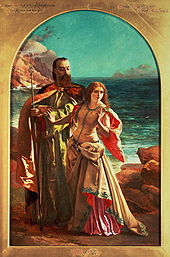

Our revels now are ended. These our actors,
As I foretold you, were all spirits and
Are melted into air, into thin air;
And—like the baseless fabric of this vision—
The cloud-capped towers, the gorgeous palaces,
The solemn temples, the great globe itself,
Yea, all which it inherit, shall dissolve,
And like this insubstantial pageant faded,
Leave not a rack behind. We are such stuff
As dreams are made on, and our little life
Is rounded with a sleep. …
—Prospero




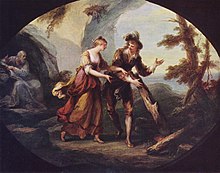
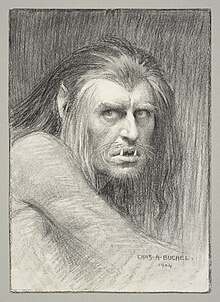

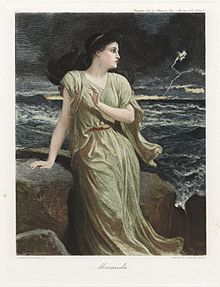


Fyodor Paramonov as Caliban, Maly Theatre (Moscow), 1905
Act I
- Antonio: Where is the master, boatswain?
Boatswain: Do you not hear him? You mar our labour: keep your cabins; you do assist the storm.
Gonzalo: Nay, good, be patient.
Boatswain: When the sea is. Hence! What cares these roarers for the name of king? To cabin! silence! Trouble us not.
Gonzalo: Good, yet remember whom thou hast aboard.
Boatswain: None that I more love than myself. You are counsellor; — if you can command these elements to silence, and work the peace of the present, we will not hand a rope more. Use your authority; if you cannot, give thanks you have liv’d so long, and make yourself ready in your cabin for the mischance of the hour, if it so hap.- Scene i
- I have great comfort from this fellow. Methinks he hath no drowning mark upon him; his complexion is perfect gallows.
- Gonzalo, scene i
- A pox o’ your throat, you bawling, blasphemous,
incharitable dog!- Sebastian, scene i
- All lost! to prayers, to prayers! All lost!
- Mariners, scene i
- Now would I give a thousand furlongs of sea for an acre of barren ground — long heath, brown furze, anything. The wills above be done, but I would fain die a dry death.
- Gonzalo, scene i
- Miranda: If by your art, my dearest father, you have
Put the wild waters in this roar, allay them.
The sky, it seems, would pour down stinking pitch,
But that the sea, mounting to the welkin’s cheek,
Dashes the fire out. O, I have suffered
With those that I saw suffer! A brave vessel,
Who had, no doubt, some noble creatures in her,
Dash’d all to pieces! O, the cry did knock
Against my very heart! Poor souls, they perish’d!
Had I been any god of power, I would
Have sunk the sea within the earth, or e’er
It should the good ship so have swallow’d, and
The fraughting souls within her.
Prospero: Be collected;
No more amazement; tell your piteous heart
There’s no harm done.
Miranda: O, woe the day!
Prospero: No harm.
I have done nothing but in care of thee —
Of thee, my dear one! thee, my daughter.- Scene ii
- Miranda: You have often
Begun to tell me what I am; but stopp’d,
And left me to a bootless inquisition,
Concluding, Stay; not yet.
Prospero: The hour’s now come;
The very minute bids thee ope thine ear.- Scene ii
- What see’st thou else
In the dark backward and abysm of time?- Prospero, scene ii
- The government I cast upon my brother,
And to my state grew stranger, being transported
And rapt in secret studies.- Prospero, scene ii
- I, thus neglecting worldly ends, all dedicated
To closeness, and the bettering of my mind- Prospero, scene ii
- Like one
Who having unto truth, by telling of it,
Made such a sinner of his memory,
To credit his own lie.- Prospero, scene ii
- My library
Was dukedom large enough.- Prospero, scene ii
- Knowing I lov’d my books, he furnish’d me,
From mine own library, with volumes that
I prize above my dukedom.- Prospero, scene ii
- Know thus far forth:
By accident most strange, bountiful Fortune —
Now my dear lady — hath mine enemies
Brought to this shore; and by my prescience
I find my zenith doth depend upon
A most auspicious star, whose influence
If now I court not, but omit, my fortunes
Will ever after droop.- Prospero, scene ii
- All hail, great master! grave sir, hail! I come
To answer thy best pleasure; be’t to fly,
To swim, to dive into the fire, to ride
On the curl’d clouds. To thy strong bidding task
Ariel, and all his quality.- Ariel, scene ii
- Ferdinand,
With hair up-staring, — then like reeds, not hair, —
was the first man that leapt; cried Hell is empty,
And all the devils are here.- Ariel, scene ii
- From the still-vex’d Bermoothes.
- Ariel, scene ii
- I will be correspondent to command,
And do my spriting gently.- Ariel, scene ii
- Caliban: As wicked dew as e’er my mother brush’d
With raven’s feather from unwholesome fen,
Drop on you both! a south-west blow on ye,
And blister you all o’er!
Prospero: For this, be sure, to-night thou shalt have cramps,
Side-stitches that shall pen thy breath up; urchins
Shall, for that vast of night that they may work,
All exercise on thee; thou shalt be pinch’d
As thick as honeycomb, each pinch more stinging
Than bees that made ’em.- Scene ii
- This island’s mine, by Sycorax my mother,
Which thou tak’st from me. When thou cam’st first,
Thou strok’st me and made much of me, wouldst give me
Water with berries in’t, and teach me how
To name the bigger light, and how the less,
That burn by day and night; and then I lov’d thee,
And show’d thee all the qualities o’ the isle,
The fresh springs, brine-pits, barren place and fertile.
Curs’d be I that did so! All the charms
Of Sycorax, toads, beetles, bats, light on you!
For I am all the subjects that you have,
Which first was mine own king.- Caliban, scene ii
- You taught me language, and my profit on’t
Is, I know how to curse. The red plague rid you,
For learning me your language!- Caliban, scene ii
- If thou neglect’st, or dost unwillingly
What I command, I’ll rack thee with old cramps,
Fill all thy bones with aches, make thee roar,
That beasts shall tremble at thy din.- Prospero, scene ii
- Come unto these yellow sands,
And then take hands;
Curt’sied when you have and kiss’d,
The wild waves whist,
Foot it featly here and there,
And, sweet sprites, the burden bear.- Ariel, scene ii
- Full fathom five thy father lies;
Of his bones are coral made;
Those are pearls that were his eyes;
Nothing of him that doth fade,
But doth suffer a sea-change
Into something rich and strange.
Sea-nymphs hourly ring his knell:
Ding-dong.
Hark! now I hear them — Ding-dong, bell.- Ariel, scene ii
- The fringed curtains of thine eye advance,
And say what thou seest yond.- Prospero, scene ii
- This
Is the third man that e’er I saw; the first
That e’er I sigh’d for.- Miranda, scene ii
- There’s nothing ill can dwell in such a temple:
If the ill spirit have so fair a house,
Good things will strive to dwell with ’t.- Miranda, scene ii
- My spirits, as in a dream, are all bound up.
My father’s loss, the weakness which I feel,
The wreck of all my friends, nor this man’s threats,
To whom I am subdu’d, are but light to me,
Might I but through my prison once a day
Behold this maid. All corners else o’ th’ earth
Let liberty make use of; space enough
Have I in such a prison.- Ferdinand, scene ii
Act II
- Gonzalo: Here is everything advantageous to life.
Antonio: True; save means to live.- Scene i
- Alonso: You cram these words into mine ears against
The stomach of my sense. Would I had never
Married my daughter there! for, coming thence,
My son is lost; and, in my rate, she too,
Who is so far from Italy remov’d
I ne’er again shall see her. O thou mine heir
Of Naples and of Milan, what strange fish
Hath made his meal on thee?
Francesco: Sir, he may live:
I saw him beat the surges under him,
And ride upon their backs; he trod the water,
Whose enmity he flung aside, and breasted
The surge most swol’n that met him; his bold head
‘Bove the contentious waves he kept, and oar’d
Himself with his good arms in lusty stroke
To the shore, that o’er his wave-worn basis bow’d,
As stooping to relieve him; I not doubt
He came alive to land.- Scene i
- Sebastian: Well, I am standing water.
Antonio: I’ll teach you how to flow.- Scene i
- We all were sea-swallow’d, though some cast again:
And, by that destiny, to perform an act,
Whereof what’s past is prologue, what to come
In yours and my discharge.- Antonio, scene I
- While you here do snoring lie,
Open-ey’d Conspiracy
His time doth take.
If of life you keep a care,
Shake off slumber, and beware.
Awake, awake!- Ariel, scene i
- All the infections that the sun sucks up
From bogs, fens, flats, on Prosper fall, and make him
By inch-meal a disease! His spirits hear me,
And yet I needs must curse; but they’ll nor pinch,
Fright me with urchin-shows, pitch me i’ the mire,
Nor lead me, like a firebrand, in the dark
Out of my way, unless he bid ’em; but
For every trifle are they set upon me;
Sometime like apes, that moe and chatter at me,
And after, bite me; then like hedgehogs, which
Lie tumbling in my barefoot way, and mount
Their pricks at my footfall; sometime am I
All wound with adders, who, with cloven tongues,
Do hiss me into madness.- Caliban, scene ii
- A very ancient and fish-like smell.
- Trinculo, scene ii
- Misery acquaints a man with strange bedfellows.
- Trinculo, scene ii
- The master, the swabber, the boatswain, and I,
The gunner, and his mate,
Lov’d Mall, Meg, and Marian, and Margery,
But none of us car’d for Kate;
For she had a tongue with a tang,
Would cry to a sailor Go hang!
She lov’d not the savour of tar nor of pitch,
Yet a tailor might scratch her where’er she did itch.
Then to sea, boys, and let her go hang!
This is a scurvy tune too; but here’s my comfort. [Drinks]- Stephano, scene ii
- Stephano: Here; swear then how thou escapedst.
Trinculo: Swam ashore man, like a duck; I can swim like a duck, I’ll be sworn.
Stephano: Here, kiss the book. Though thou canst swim like a duck, thou art made like a goose.- Scene ii
- Caliban: Hast thou not dropp’d from heaven?
Stephano: Out o’ th’ moon, I do assure thee; I was the Man i’ th’ Moon, when time was.
Caliban: I have seen thee in her, and I do adore thee.
My mistress show’d me thee, and thy dog and thy bush.- Scene ii
- I prithee, be my god.
- Caliban, scene ii
Act III
- There be some sports are painful, and their labour
Delight in them sets off; some kinds of baseness
Are nobly undergone; and most poor matters
Point to rich ends. This my mean task
Would be as heavy to me as odious, but
The mistress which I serve quickens what’s dead,
And makes my labours pleasures.- Ferdinand, scene i
- Full many a lady
I have ey’d with best regard; and many a time
The harmony of their tongues hath into bondage
Brought my too diligent ear; for several virtues
Have I lik’d several women, never any
With so full soul, but some defect in her
Did quarrel with the noblest grace she ow’d,
And put it to the foil; but you, O you,
So perfect and so peerless, are created
Of every creature’s best!- Ferdinand, scene i
- Miranda: Do you love me?
Ferdinand: O heaven! O earth! Bear witness to this sound,
And crown what I confess with kind event,
If I speak true! If hollowly, invert
What best is boded me to mischief! I,
Beyond all limit of what else i’ the world
Do love, prize, honour you.- Scene i
- Ferdinand: Wherefore weep you?
Miranda: At mine unworthiness, that dare not offer
What I desire to give, and much less take
What I shall die to want.- Scene i
- I am your wife, if you will marry me;
If not, I’ll die your maid. To be your fellow
You may deny me; but I’ll be your servant,
Whether you will or no.- Miranda, scene i
- Ferdinand: Here ’s my hand.
Miranda: And mine, with my heart in ’t.- Scene i
- Servant-monster! the folly of this island! They say there’s but five upon this isle: we are three of them; if th’ other two be brain’d like us, the state totters.
- Trinculo, scene ii
- How does thy honour? Let me lick thy shoe.
I’ll not serve him, he is not valiant.- Caliban, scene ii
- Ariel: Thou liest.
Caliban: Thou liest, thou jesting monkey, thou: I would my
valiant monster would destroy thee: I do not lie.
Stephano: Trinculo, if you trouble him any more in’s tale, by this hand, I will supplant some of your teeth.- Scene ii
- Why, as I told thee, ’tis a custom with him
I’ the afternoon to sleep; there thou mayst brain him,
Having first seiz’d his books; or with a log
Batter his skull, or paunch him with a stake,
Or cut his wezand with thy knife. Remember,
First to possess his books; for without them
He’s but a sot, as I am, nor hath not
One spirit to command: they all do hate him,
As rootedly as I — burn but his books.- Caliban, scene ii
- Flout ’em and scout ’em, and scout ’em and flout ’em;
Thought is free.- Stephano, scene ii
- He that dies pays all debts: I defy thee. Mercy upon us!
- Stephano, scene ii
- Be not afeard. The isle is full of noises,
Sounds, and sweet airs, that give delight, and hurt not.
Sometimes a thousand twangling instruments
Will hum about mine ears; and sometimes voices,
That, if I then had wak’d after long sleep,
Will make me sleep again; and then, in dreaming,
The clouds methought would open and show riches
Ready to drop upon me, that, when I wak’d,
I cried to dream again.- Caliban, scene ii
- Alonso: Give us kind keepers, heavens! What were these?
Sebastian: A living drollery. Now I will believe
That there are unicorns; that in Arabia
There is one tree, the phoenix’ throne, one phoenix
At this hour reigning there.
Antonio: I’ll believe both;
And what does else want credit, come to me,
And I’ll be sworn ’tis true; travellers ne’er did lie,
Though fools at home condemn ’em.- Scene iii
- A kind
Of excellent dumb discourse.- Alonso, scene iii
- You are three men of sin, whom Destiny, —
That hath to instrument this lower world
And what is in’t, —the never-surfeited sea
Hath caus’d to belch up you; and on this island
Where man doth not inhabit, you ‘mongst men
Being most unfit to live. I have made you mad;
And even with such-like valour, men hang and drown
Their proper selves.
[Alonso, Sebastian, etc., draw their swords]
You fools! I and my fellows
Are ministers of Fate; the elements,
Of whom your swords are temper’d may as well
Wound the loud winds, or with bemock’d-at stabs
Kill the still-closing waters, as diminish
One dowle that’s in my plume.- Ariel, scene iii
- O, it is monstrous, monstrous!
Methought the billows spoke, and told me of it;
The winds did sing it to me; and the thunder,
That deep and dreadful organ-pipe, pronounc’d
The name of Prospero; it did bass my trespass.
Therefore my son i’ the ooze is bedded; and,
I’ll seek him deeper than e’er plummet sounded,
And with him there lie mudded.- Alonso, scene iii
Act IV
- The strongest oaths are straw
To th’ fire i’ the blood. Be more abstemious,
Or else good night your vow!- Prospero, scene i
- Ceres: Hail, many-coloured messenger, that ne’er
Dost disobey the wife of Jupiter;
Who, with thy saffron wings, upon my flow’rs
Diffusest honey drops, refreshing show’rs;
And with each end of thy blue bow dost crown
My bosky acres and my unshrubb’d down,
Rich scarf to my proud earth; — why hath thy Queen
Summon’d me hither to this short-grass’d green?
Iris: A contract of true love to celebrate,
And some donation freely to estate
On the blest lovers.- Scene i
- Our revels now are ended. These our actors,
As I foretold you, were all spirits, and
Are melted into air, into thin air;
And, like the baseless fabric of this vision,
The cloud-capp’d towers, the gorgeous palaces,
The solemn temples, the great globe itself,
Yea, all which it inherit, shall dissolve,
And, like this insubstantial pageant faded,
Leave not a rack behind. We are such stuff
As dreams are made on; and our little life
Is rounded with a sleep.- Prospero, scene i
- Pray you, tread softly, that the blind mole may not
Hear a foot fall; we now are near his cell.- Caliban, scene i
- Trinculo: Ay, but to lose our bottles in the pool —
Stephano: There is not only disgrace and dishonor in that, monster, but an infinite loss.- scene i
- With foreheads villainous low.
- Caliban, scene i
Act V
- Though with their high wrongs I am struck to the quick,
Yet, with my nobler reason ‘gainst my fury
Do I take part; the rarer action is
In virtue than in vengeance.- Prospero, scene i
- Ye elves of hills, brooks, standing lakes, and groves;
And ye that on the sands with printless foot
Do chase the ebbing Neptune, and do fly him
When he comes back; you demi-puppets that
By moonshine do the green sour ringlets make,
Whereof the ewe not bites; and you whose pastime
Is to make midnight mushrooms, that rejoice
To hear the solemn curfew; by whose aid —
Weak masters though ye be — I have be-dimm’d
The noontide sun, call’d forth the mutinous winds,
And ‘twixt the green sea and the azur’d vault
Set roaring war. To the dread rattling thunder
Have I given fire, and rifted Jove’s stout oak
With his own bolt; the strong-bas’d promontory
Have I made shake, and by the spurs pluck’d up
The pine and cedar. Graves at my command,
Have wak’d their sleepers, op’d, and let ’em forth,
By my so potent art. But this rough magic
I here abjure; and, when I have requir’d
Some heavenly music — which even now I do, —
To work mine end upon their senses that
This airy charm is for, I’ll break my staff,
Bury it certain fathoms in the earth,
And, deeper than did ever plummet sound,
I’ll drown my book.- Prospero, scene i
- Where the bee sucks, there suck I;
In a cowslip’s bell I lie;
There I couch when owls do cry.
On the bat’s back I do fly
After summer merrily.
Merrily, merrily, shall I live now,
Under the blossom that hangs on the bough.- Ariel, scene i
- O, wonder!
How many goodly creatures are there here!
How beauteous mankind is! O brave new world,
That has such people in’t!- Miranda, scene i
- It is this statement by Miranda which provided Aldous Huxley the title of his dystopian novel, Brave New World, in which “The Savage” quotes this passage.
Epilogue
- Now my charms are all o’erthrown,
And what strength I have’s mine own,
Which is most faint: now, ’tis true,
I must be here confin’d by you,
Or sent to Naples. Let me not,
Since I have my dukedom got
And pardon’d the deceiver, dwell
In this bare island by your spell;
But release me from my bands
With the help of your good hands.
Gentle breath of yours my sails
Must fill, or else my project fails,
Which was to please. Now I want
Spirits to enforce, art to enchant;
And my ending is despair,
Unless I be reliev’d by prayer,
Which pierces so that it assaults
Mercy itself, and frees all faults.
As you from crimes would pardon’d be,
Let your indulgence set me free.- Prospero
| William Merritt Chase | |
|---|---|

William Merritt Chase in 1900
|
|
Today is the birthday of William Merritt Chase (Nineveh, Indiana; November 1, 1849 – October 25, 1916 New York City); painter, known as an exponent of Impressionism and as a teacher. He is also responsible for establishing the Chase School, which later would become Parsons The New School for Design.
Gallery
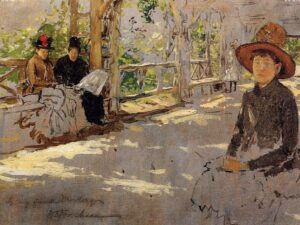
Femmes sous Treillis. 1886







-

Mrs Chase Playing the Piano, 1883
-

Portrait of Miss Dora Wheeler, 1883
-

A Modern Magdalen, 1888
-

Open Air Breakfast, 1888
-
An Afternoon Stroll, c. 1895 San Diego Museum of Art
-

First Touch of Autumn, 1898
-

A Sunny Day at Shinnecock Bay, c. 1892
-

In The Studio, c. 1892-3
-

The Song, 1907
-

The Moorish Warrior, ca. 1878. Brooklyn Museum.
-

Girl in a Japanese Costume, ca. 1890. Brooklyn Museum
-

Study of a Girl in Japanese Dress ca. 1895 Brooklyn Museum
| Stephen Crane | |
|---|---|
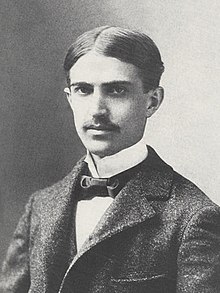
Formal portrait of Stephen Crane taken in Washington, D.C., about March 1896
|
|
Today is the birthday of Stephen Crane (Newark, New Jersey; November 1, 1871 – June 5, 1900 Badenweiler, German Empire); poet, novelist, and short story writer. Prolific throughout his short life, he wrote notable works in the Realist tradition as well as early examples of American Naturalism and Impressionism. In my opinion, one of the most innovative writers of his generation.
In 1896, Crane endured a highly publicized scandal after appearing as a witness in the trial of a suspected prostitute, an acquaintance named Dora Clark. Late that year he accepted an offer to travel to Cuba as a war correspondent. As he waited in Jacksonville, Florida, for passage, he met Cora Taylor, with whom he began a lasting relationship. En route to Cuba, Crane’s vessel the SS Commodore, sank off the coast of Florida, leaving him and others adrift for 30 hours in a dinghy. Crane described the ordeal in “The Open Boat”. During the final years of his life, he covered conflicts in Greece (accompanied by Cora, recognized as the first woman war correspondent) and later lived in England with her. He was befriended by writers such as Joseph Conrad and H. G. Wells. Plagued by financial difficulties and ill health, Crane died of tuberculosis in a Black Forest sanatorium in Germany at the age of 28.
Crane’s writing is characterized by vivid intensity, distinctive dialects, and irony. Common themes involve fear, spiritual crises and social isolation. Although recognized primarily for The Red Badge of Courage, which has become an American classic, Crane is also known for his poetry, journalism, and short stories such as “The Open Boat”, “The Blue Hotel”, “The Bride Comes to Yellow Sky”, and The Monster. His writing made a deep impression on 20th-century writers, most prominent among them Ernest Hemingway, and is thought to have inspired the Modernists and the Imagists.
Verse
- Unwind my riddle.
Cruel as hawks the hours fly;
Wounded men seldom come home to die;
The hard waves see an arm flung high;
Scorn hits strong because of a lie;
Yet there exists a mystic tie.
Unwind my riddle.- Epigraph in “The Clan of No Name” (1899); published in the anthology Wounds in the Rain (1900)
The Black Riders and Other Lines (1895)
- In the desert
I saw a creature, naked, bestial,
Who, squatting upon the ground,
Held his heart in his hands,
And ate of it.
I said, “Is it good, friend?”
“It is bitter—bitter,” he answered;
“But I like it
Because it is bitter,
And because it is my heart.”- III
- If there is a witness to my little life,
To my tiny throes and struggles,
He sees a fool;
And it is not fine for gods to menace fools.- XIII
- I saw a man pursuing the horizon;
Round and round they sped.
I was disturbed at this;
I accosted the man.
“It is futile,” I said,
“You can never—” - “You lie,” he cried,
And ran on.- XXIV
War Is Kind and Other Lines (1899)
- Do not weep, maiden, for war is kind.
Because your lover threw wild hands toward the sky
And the affrighted steed ran on alone,
Do not weep.
War is kind.- Do Not Weep, Maiden, For War is Kind, No. 1, st. 1
- Hoarse, booming drums of the regiment,
Little souls who thirst for fight,
These men were born to drill and die.
The unexplained glory flies above them,
Great is the battle-god, great, and his kingdom —
A field where a thousand corpses lie.- Do Not Weep, Maiden, For War is Kind, st. 2
- Do not weep, babe, for war is kind.
Because your father tumbled in the yellow trenches,
Raged at his breast, gulped and died,
Do not weep.
War is kind.- Do Not Weep, Maiden, For War is Kind, st. 3
- Swift blazing flag of the regiment,
Eagle with crest of red and gold,
These men were born to drill and die.
Point for them the virtue of slaughter,
Make plain to them the excellence of killing
And a field where a thousand corpses lie.- Do Not Weep, Maiden, For War is Kind, st. 4
- The wayfarer,
Perceiving the pathway to truth,
Was struck with astonishment.
It was thickly grown with weeds.
“Ha,” he said,
“I see that none has passed here
In a long time.”
Later he saw that each weed
Was a singular knife.
“Well,” he mumbled at last,
“Doubtless there are other roads.”- The Wayfarer, No. 13
- A man said to the universe:
“Sir I exist!”
“However,” replied the universe,
“The fact has not created in me
A sense of obligation.”- A Man Said to the Universe, No. 20
| Louis Dewis | |
|---|---|
 |
|
Today is the birthday of Louis Dewis (Mons 1872– 5 December 1946 Biarritz, France); Belgian Post-Impressionist painter, who lived most of his adult life in France.
Louis Dewachter married Elisabeth Florigni (1873 – 25 August 1952). Elisabeth was a Bordeaux socialite and the daughter of Joseph Jules Florigni (1842 – 14 April 1919) and Rose Lesfargues Palmyre Florigni (1843 – 11 September 1917).
Gallery
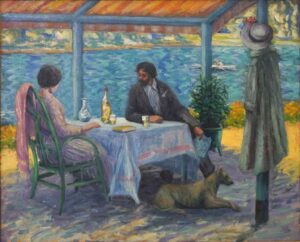
Confidants

| Konrad Mägi | |
|---|---|

Konrad Mägi (photo c. 1898-1905)
|
|
Today is the birthday of Konrad Vilhelm Mägi (Hellenurme Manor, Rõngu Parish, Tartu County (now in Palupera Parish, Valga County); 1 November 1878 – 15 August 1925 Tartu); painter, primarily known for his landscape work. He was one of the most colour-sensitive Estonian painters of the first decades of the 20th century, and Mägi’s works on motifs of the island of Saaremaa are the first modern Estonian nature paintings.
Gallery
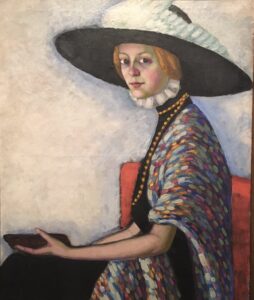
|
Mac Tag

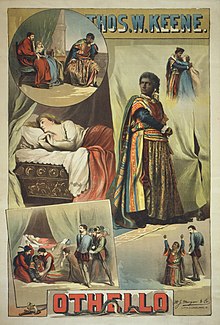

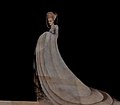






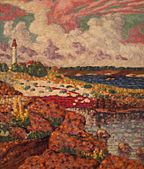






No Comments on "The Lovers’ Chronicle 1 November – imagine – Shakespeare’s Othello & The Tempest – art by William Merritt Chase, Louis Dewis, & Konrad Mägi – verse by Stephen Crane"